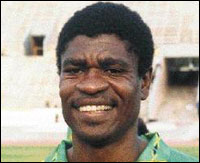
Your Premier Jamaican Sports Portal
 Your Premier Jamaican Sports Portal |
|
| |
Football
A life built on football
PETER Cargill has made football his life from his playing days at Camperdown High School through his professional life in Israel to being captain of the team which historically qualified for World Cup 1998. Cargill afterwards ascended to assistant coach at the national level and was last in charge of the junior Reggae Boyz, who recently crashed out of Olympic qualifying. Relieved of national duties by the new Jamaica Football Federation hierarchy after the Under-23s' failure, Cargill reflects one-on-one with The Gleaner on his career at the national level as a player and coach. QUESTION: How would you sum up your international career as a player and coach? PETER CARGILL: I'm grateful. I am in a position where I'm honoured to have represented my country at the level I have. Also, I've made some great friends in football, locally and internationally, and that will continue long after football. Q: What have been your most satisfying moments in football? P.C: Being a part of two eras, playing with the likes of Carl Brown and then the younger ones, Gardner, Lowe, Davis and Messam, culminating with World Cup qualification. I played against Carl Brown and he was afterwards my coach. Coaching, there were a lot of great moments, starting with Simoes, him being like a teacher, then there was Lazaroni, de Oliveira and Carl Brown. Q: How has football impacted on your life? P.C.: For a person who only worked one year outside of football, it has (impacted) a lot. Most of my life has been football and that will not stop. Q: What other work have you done? P.C.: I worked in the grains and cereals department at Seprod around 1984 or '85 after leaving Camperdown in 1982. I was just a normal little worker like everybody else. Q: Of all the coaches you've been involved with, who has made the biggest impression on your career? P.C: All of them you take something from, starting in Israel when I played there. Simoes was one of the best, no doubt about that. Q: Do you plan to return to coaching locally? P.C.: At this moment I'm taking a little time out, chill out, where the road takes me, take it one day at a time. Q: How confident are you of Jamaica reaching World Cup 2006? P.C.: They have a chance. They just need to step past Haiti to get to the next round. We have quality players abroad and some nice, new players coming in. Once everybody stays healthy, we have a good chance. Q: What about the difference in eras where the players are concerned, your time compared to now? P.C.: The difference is obvious. In our time, 70-90 per cent of our team was based in Jamaica. Therefore, we were more like a club than a national team. These new players have three or four days together and have to perform. That must be more difficult. That's why we dominated so much in Jamaica. Every game we played was on 'our' field. It was like a club. That's much different from these players. I tip my hat to them, they're really making some effort. Q: Where would Peter Cargill like to see local football? P.C: It needs to keep moving in the direction of facilities. If there's nowhere to play it doesn't make sense. People must have somewhere to go sit down and watch Premier League football at 6:00 or 7:00 in the evenings. Q: What about the progress of home-grown footballers on the professional circuit overseas. P.C: That's great. As long as they're part of a professional environment, that must be the ambition and aspiration of our clubs to move to that level. We need to get professional, make people accountable for everything they do. Once you get that going, that's the way to go
|